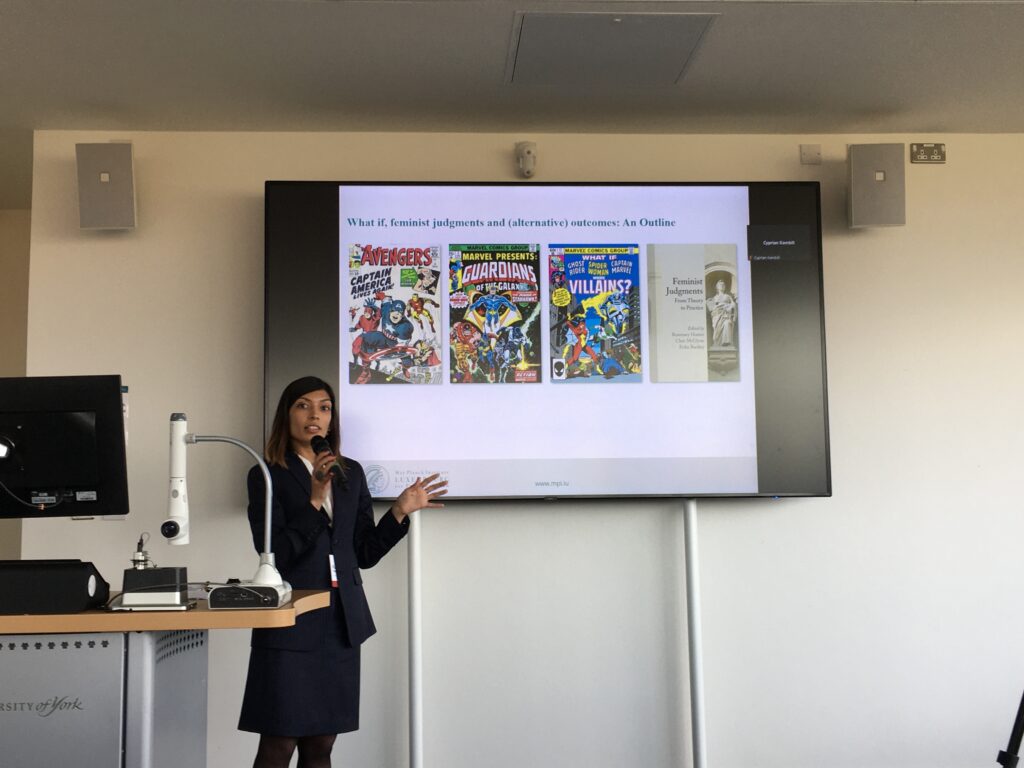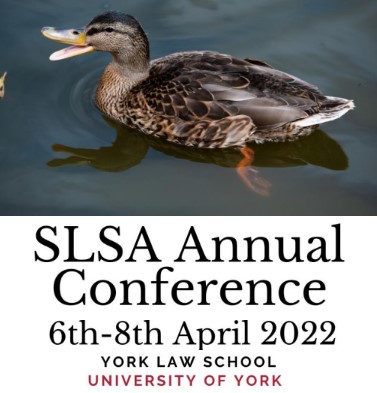
The conference for the Socio-Legal Studies Association was held this year at the University of York. Kritika Sharma presented there in the stream on “Jurisprudence of the Future: Law, Justice and Science Fiction”. Her paper was entitled “What-if, feminist judgments and (other) alternative outcomes: Feminism or science fiction?”. She presented in the first panel of the conference and opened it together with Mitch Travis and Amanda Perry-Kessaris. The panel was entitled entitled “Why Science Fiction/Science Fiction as Method”,
Kritika’s paper focused specifically on the feminist judgments project and compared it to Marvel comics’ “What-if” series. The goal underpinning this comparison was to demonstrate how science fiction can be employed as a tool to map and analyse feminist approaches to international law, including the feminist judgments projects.
The commonalities in both projects are plentiful as they encouraged readers to think of an alternative future. Imagination, rather than a strict adherence to the truth, is crucial. Both the comics and the feminist judgment project functioned through creativity and had the capacity to inspire change for social good.
Mitch Travis, co-convenor of the section with Alex Green, praised Kritika’s approach. He saw her work as being at “the intersection between legal theory and cultural depictions of the future”. He commented that the “interplay between the Feminist Judgments Project and Marvel’s ‘What If?’ was fascinating”; he applauded it as “a springboard into further speculative judgments”.

The stream “Jurisprudence of the Future: Law, Justice and Science Fiction” had an electric, enthusiastic and friendly atmosphere. The participants – both speakers and listeners – were open, lively and highly active. There were eight panels in this stream across the 3 days and 24 individuals presented their new work and ongoing research. The conference was hybrid, but this was the first in person conference since the pandemic for many. It an excellent opportunity to met new colleagues and renew old friendships. Around 500 people were in attendance at the SLSA. The discussion of law, science fiction and jurisprudence continues, now the conference has finished.
Mitch Travis, Alex Green and Kieran Tranter are editing a special issue of Law, Technology and Humans. Much like Kritika’s paper, contributions in this special issue will consider science fiction and its cultural legal imaginary as well as its contribution to futuristic jurisprudence. More detail can be found in the call for papers, which is available here.

About the Speaker:

Kritika Sharma has received her advanced Master’s degree (Cum Laude) in Public International Law with a specialisation on International Criminal Law from Leiden University, where she is currently also a PhD candidate and writing her dissertation under the supervision of Prof Dr. Niels Blokker and Dr. Sergey Vasiliev. Her dissertation is on the topic of the impact of the governance role of the Assembly of State Parties to the Rome Statute on the judicial function of the International Criminal Court. Additionally, she has supported the Delegation of Liechtenstein at the Assembly of States Parties to the Rome Statute in 2016 as well as in 2018.
After working at the International Court of Justice as a Judicial Fellow, Kritika Sharma has moved on to work at the Max Planck Institute for Procedural Law in Luxembourg as a Research Fellow. Her research focus is on the field of International Criminal Law and International Institutional Law and she has supported projects on “Arbitration in the Digital Age” and International Institutional Law as a Research Assistant.








